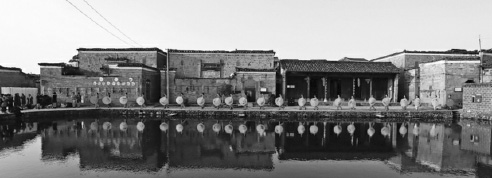 |
|
Zhuqiao village hosts a qipao show to attract tourists. Qipao is one of the traditional Chinese dresses for women.[Photo provided to China Daily] |
Passing on traditions
Yu Xuting started renovating old houses in villages in 2008, when he only had a few men working with him. A local from Jinxi county, the 40-year-old used to travel to other places to restore old houses bought by rich people from rural areas. Now he has decided to devote the next few years into fixing up old houses in local villages in Jinxi, where thou-sands of old houses need to rehabilitating for their original owners.
"In Jinxi, people were blind to the value of their homes. They just left their houses and moved to cities. But things have changed in recent years, and I have started getting orders from local villagers," says Yu.
Last year, Yu and his team, which has expanded to 80, including carpenters, carvers and painters, renovated more than 30 old houses in his hometown. The number of orders he used to receive was just four or five.
"People realize that old houses were not useless as they thought before. And they do respect the legacy of their ancestors as long as they have money to repair it," Yu says.
Between 50 to 70 percent of the cost of renovating the houses in Jinxi is being covered by the local government and the Saving Traditional Houses Initiatives program based on each house owner's financial status.
Also, some companies and even individuals have come to Jinxi to help fix up the old houses.
He Yan, director of the Tsinghua Heritage Institute for Digitalization, has been impressed by the big scale of various ancient villages in Jinxi, where small, mid-sized and big ancient villages can be found depending on their locale.
He's team has spent three years doing research on 68 ancient villages in the area, gathering data on the ancient houses, establishing a kind of village archive and help making videos for documentary use, all for free. Now, her company is assisting the locals by providing guidance on how to repair their old houses appropriately.
For He, the area is a treasure trove of Chinese architecture. She has introduced it to the architecture school of Tsinghua University as a study base for its students.
Last year, she donated a sum of money to help renovate an old house in Zhuqiao village. Most of the villagers are descendants of senior officials or scholars in the Ming and Qing dynasties.
"It's not a big sum money for me. In two weeks, the repairs were completed, very quick," she says.
Fu Qingyuan, an expert on ancient village protection, also donated a sum of money last year. He says he wanted to set an example so more individuals would protect these ancient houses.
Fu says the essence of Chinese architecture lies in the wooden structures of old village houses.
"It's more than simply repairing a house. It's about passing on our traditions to future generations."